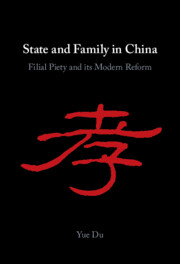Book contents
- State and Family in China
- State and Family in China
- Copyright page
- Epigraph
- Contents
- Preface
- Abbreviations
- Introduction
- Part I Ruling the Empire through the Principle of Filiality
- 1 “Parents Can Never Be Wrong”
- 2 Policies and Counterstrategies
- 3 “Parenting All under Heaven on Behalf of Heaven”
- Part II Building the Nation through Restructuring the Family
- Conclusion
- Glossary
- Bibliography
- Index
1 - “Parents Can Never Be Wrong”
Punishing Rebellious Children as a Didactic Show
from Part I - Ruling the Empire through the Principle of Filiality
Published online by Cambridge University Press: 29 October 2021
- State and Family in China
- State and Family in China
- Copyright page
- Epigraph
- Contents
- Preface
- Abbreviations
- Introduction
- Part I Ruling the Empire through the Principle of Filiality
- 1 “Parents Can Never Be Wrong”
- 2 Policies and Counterstrategies
- 3 “Parenting All under Heaven on Behalf of Heaven”
- Part II Building the Nation through Restructuring the Family
- Conclusion
- Glossary
- Bibliography
- Index
Summary
Chapter 1 examines three instances of Qing law that humiliated, tormented, or executed rebellious children as a didactic show: (1) mandatory concealment of parents’ crimes; (2) court assistance to parents in disciplining their grown-up sons in the form of beating, canguing, or exile; and (3) executing parricides by dismemberment under the imperial insignia in summary executions. The same message was conveyed in various forms of public punishment of unfilial children: Right and wrong was a matter of position, and parental instructions demanded unquestioning obedience. By identifying imperial authority with “infallible” parental authority at various stages of judicial performance, the imperial state strengthened its own authority and deterred rebellious thoughts and actions from its subjects.
Keywords
- Type
- Chapter
- Information
- State and Family in China , pp. 23 - 59Publisher: Cambridge University PressPrint publication year: 2021
- 1
- Cited by

